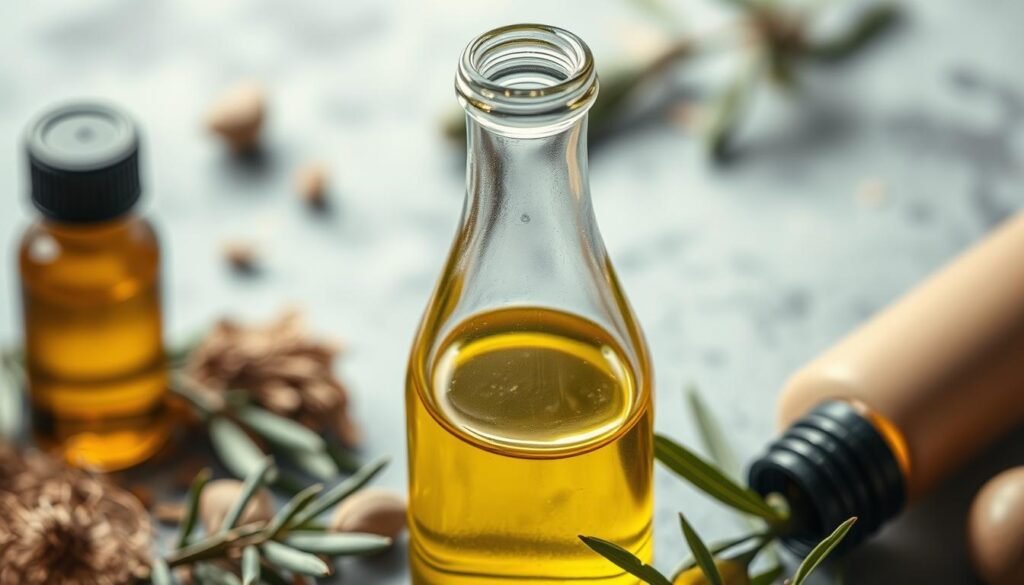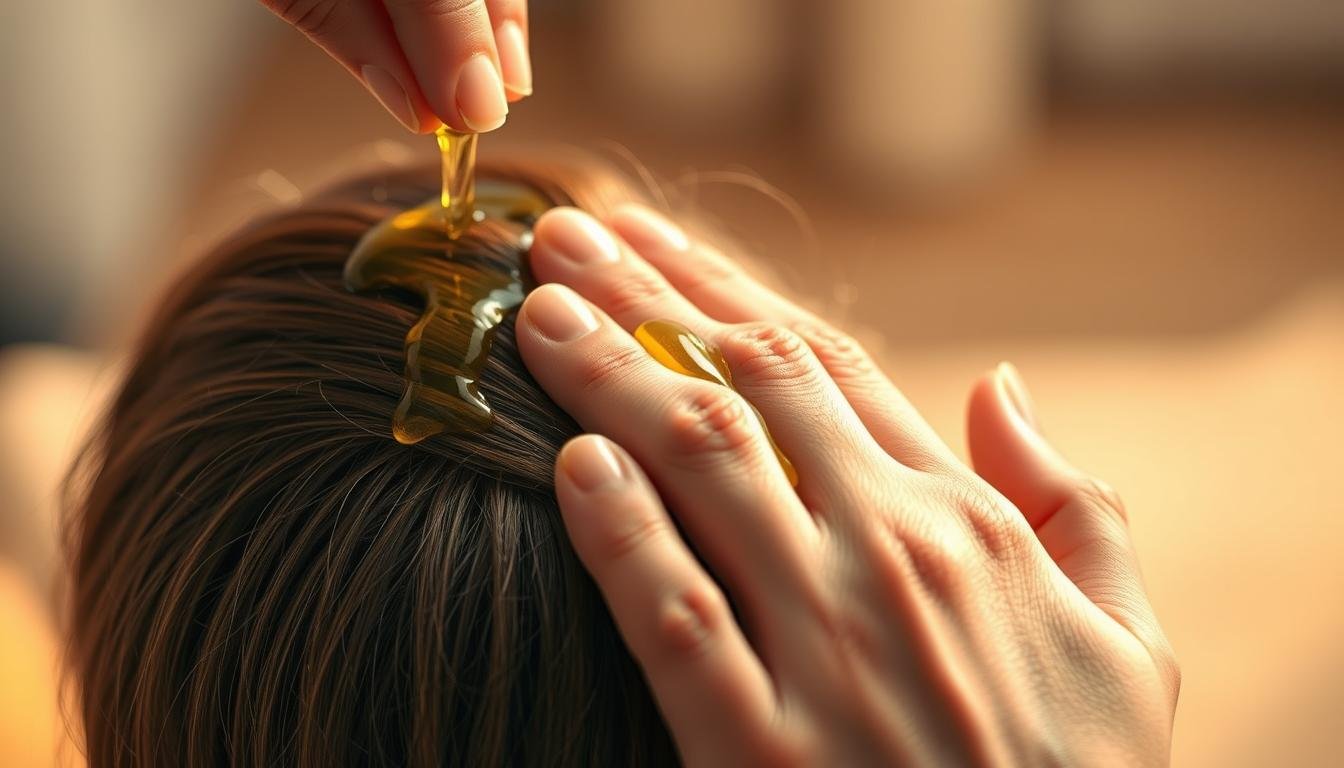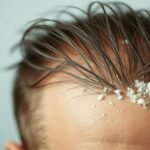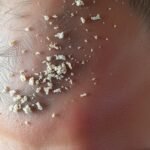Are you thinking about using olive oil for dandruff? You might wonder if it really works. With 1 out of 2 people sensitive to Malassezia Globosa fungus, finding a good treatment is key. Some say olive oil helps, but does it really?
Dandruff affects about 50% of people at some point. There’s no cure, but olive oil might help. It can moisturize the scalp and reduce flakes. This makes it a natural option for some.
Key Takeaways
- Olive oil may help reduce dandruff flakes by massaging it into the dry scalp.
- The effectiveness of olive oil for dandruff is largely anecdotal, with no definitive statistical studies to support its use.
- Olive oil is suggested to be beneficial for dry, thick hair due to its moisturizing properties.
- Using olive oil for dandruff is a trial-and-error process, and results may vary across different individuals.
- Regular use of dandruff shampoo can lead to a reduction in symptoms within a few weeks for mild cases, but olive oil can be a complementary treatment.
- A balanced diet ensuring adequate zinc and B vitamins can improve scalp health and reduce dandruff incidence.
Understanding Dandruff and Its Common Causes
Dandruff is a common scalp condition that affects millions worldwide. To use olive oil for dandruff, knowing its causes is key. It’s often linked to a fungal infection by Malassezia Globosa, which eats the sebum from sebaceous glands.
About 50% of adults globally have dandruff, with men more likely to get it. Symptoms get worse in the fall and winter when the air is dry. If you’re wondering if olive oil treats dandruff, knowing traditional treatments might not work is important.
Causes of dandruff include higher androgen hormone levels and certain health issues like Parkinson’s disease and HIV. Shampooing two to three times a week can help manage oil and slow malassezia yeast growth. Olive oil is a natural option for those seeking alternatives.
Dandruff can happen at any age, often starting in puberty. Knowing the causes and symptoms is key to finding the right treatment. This could be a medicated shampoo or olive oil.
The Science Behind Olive Oil’s Properties
Olive oil is packed with good fats, antioxidants, and vitamins E and K. These might explain why it’s good for hair and scalp health, like treating dandruff. Its moisturizing and anti-inflammatory properties can help soothe dandruff symptoms. Using it as a hair mask can reduce flaking and calm the scalp.
Olive oil softens and moisturizes hair and scalp, fights inflammation, and protects against UV damage. It also has antifungal properties to combat scalp yeast infections. Plus, it seals the hair cuticle, keeping moisture in, though coconut oil might do this better.
For the best results, choose high-quality extra virgin olive oil. It’s less processed and keeps more nutrients and antioxidants. You can use it as a pre-shampoo treatment, hair mask, or leave-in conditioner. But, use it sparingly to avoid greasy hair and scalp issues.
Key components of olive oil include:
- Triglycerides of fatty acids
- Phenols
- Beta carotene
- Lutein
These elements work together to moisturize, reduce inflammation, and protect. This makes olive oil a favorite for hair and scalp care, including dandruff treatments.
Can Olive Oil Help Dandruff? The Research Evidence
Looking into olive oil for dandruff relief? It’s key to check the research. Some studies say olive oil might help a bit, but others say it doesn’t solve the real problem. Most of the good stuff about olive oil for dandruff comes from people’s experiences, not big studies.
Clinical Studies on Olive Oil and Scalp Health
Olive oil is full of antioxidants, which are good for your hair and scalp. It’s also light, which helps get rid of dirt and extra oils. This can unclog hair follicles and reduce scalp irritation and dandruff. But, we need more research to know for sure.
Expert Opinions on Olive Oil Treatment
Experts say olive oil works best when mixed with other natural stuff. For example, adding egg white or almond oil can make it even better. These mixes can help keep your scalp healthy and fight dandruff.
Comparative Analysis with Other Natural Remedies
Comparing olive oil to coconut oil and argan oil shows its special benefits. Coconut oil keeps moisture in, but olive oil’s antioxidants fight dandruff. Here’s a quick look at olive oil’s benefits for dandruff:
| Ingredient | Benefits | Recommended Use |
|---|---|---|
| Olive Oil | Antioxidant properties, moisturizes dry scalp | 2-3 times a week |
| Egg White | Protein-rich, helps strengthen hair | 1-2 times a week |
| Almond Oil | Anti-inflammatory properties, soothes scalp | 2-3 times a week |
Understanding the research and expert views on olive oil for dandruff can help you decide if it’s right for you.
Benefits of Using Olive Oil for Scalp Health

Using olive oil for dandruff can greatly benefit your scalp. Olive oil is rich in fatty acids and antioxidants. These can condition, soften, and hydrate your hair. This can help reduce dandruff symptoms by making your scalp healthier.
Can olive oil help dandruff? Yes, it can. It moisturizes and nourishes your scalp, making dandruff less likely.
Some benefits of using olive oil for your scalp include:
- Moisturizing properties: Olive oil locks in moisture, reducing dryness and irritation.
- Antioxidant properties: It’s full of antioxidants that protect your scalp from damage.
- Anti-inflammatory properties: Olive oil can reduce redness and irritation.
Olive oil is a natural and effective treatment for dandruff. You can use it as a pre-shampoo treatment, hair mask, or leave-in conditioner. Regular use can reduce dandruff, promote hair growth, and improve scalp health.
Olive oil also benefits your hair’s health and appearance. It reduces split ends, improves manageability, and adds shine and softness. With its many benefits and natural ingredients, olive oil is a great choice for treating dandruff naturally.
| Benefits of Olive Oil | Description |
|---|---|
| Moisturizing properties | Helps to lock in moisture, reducing dryness and irritation |
| Antioxidant properties | Helps to protect the scalp from damage caused by free radicals |
| Anti-inflammatory properties | Helps to reduce redness and irritation |
How to Apply Olive Oil for Dandruff Treatment
To treat dandruff with olive oil, you need to know how to apply it right. First, wash your hair and scalp clean. This lets the olive oil reach deeper into your scalp and hair.
For a dandruff hair mask, mix olive oil with lemon juice and water. Rub it into your scalp gently. Let it sit for 30 minutes to an hour before washing it out with warm water.
Pre-Treatment Preparation
Start by washing your hair with a mild shampoo. This removes dirt and product buildup. Then, towel-dry your hair and apply the olive oil mixture to your scalp, covering all affected areas.
Step-by-Step Application Guide
Here’s how to apply olive oil for dandruff treatment:
- Warm the olive oil by placing the bottle in a bowl of hot water for a few minutes.
- Apply the warmed olive oil to your scalp, massaging it in gently.
- Leave the olive oil on for at least 30 minutes to an hour before rinsing it out with warm water.
- Shampoo your hair as usual, using a mild shampoo.
Best Practices for Optimal Results
For the best results, use high-quality extra virgin olive oil. Leave it on for the recommended time. You can also mix it with coconut oil or essential oils for extra benefits. By following these steps, you can treat dandruff and keep your scalp healthy.
Potential Side Effects and Precautions

Using olive oil for dandruff can have both good and bad sides. It may not be right for everyone. For some, olive oil can make dandruff worse because the yeast or fungus eats the fatty acids in it.
Research shows that olive oil hair secrets can be helpful. But, it’s important to think about the risks too. Always do a patch test before using olive oil on your scalp. You can also learn how to emulsify oil cleanser for better skin health.
Some people, like those with fine hair, might not want to use olive oil. It can make hair feel oily and heavy. Watch out for signs like more dandruff, itchiness, or redness on your scalp. If you see these, stop using it and talk to a doctor. Does olive oil treat dandruff? The answer is not simple, and more studies are needed.
In short, be careful when using olive oil for dandruff. Know the possible side effects and take steps to avoid them. This way, you can enjoy olive oil’s benefits without harming your hair or scalp.
Combining Olive Oil with Other Natural Ingredients
Using olive oil for dandruff can be even better when mixed with other natural ingredients. Adding lemon juice, egg whites, or tea tree oil can boost its effects. For instance, olive oil and tea tree oil together can fight dandruff-causing bacteria. Apply this mix 2 times a week.
Here are some other great combinations to try:
- Olive oil and almond oil: Use 2-3 times a week to moisturize your scalp.
- Olive oil and lemon juice: Apply 2-3 times a week to balance your scalp’s pH and reduce dandruff.
- Olive oil and neem oil: Use once a week for neem oil’s antifungal benefits and to control dandruff.
Always massage the oil mix into your scalp for 10-15 minutes. Let it sit for 30 minutes to overnight before washing with shampoo. This way, you can treat dandruff and keep your scalp healthy.
Olive oil is full of vitamin E and K. It fights dandruff-causing bacteria and boosts scalp blood flow. This reduces stress-related skin flaking. Adding olive oil to your hair care routine can help with dryness, itchiness, and dandruff.
Conclusion: Is Olive Oil Right for Your Dandruff Treatment?
Olive oil can be a natural and versatile solution for dandruff. It soothes scalp irritation and nourishes hair, making it healthier. But, it’s not right for everyone.
Olive oil may not solve the root cause of dandruff. For some, anti-dandruff shampoos or creams work better. Always talk to a dermatologist to find the best dandruff treatment for you.
Whether to use olive oil for dandruff depends on your experience and what you prefer. Knowing its benefits and limits helps you choose the best option for your scalp.








Interesting read, but isnt applying oil on the scalp counterproductive? Wont it make the hair more greasy, causing more dandruff? Just food for thought!
Interesting read, but isnt dandruff more about scalp health than what oil you use? Just seems like a push for olive oil. Thoughts?
Agree, scalp health is key. But oils, especially olive, can aid in overall scalp nourishment too!
So, olive oil for dandruff? Really? Why not just splash some virgin margarita on it? Science, sometimes youre a real hoot! 🙄😂
Hey, dont knock it til you try it! Might make your scalp as smooth as your sarcasm. 😏
Interesting read! But honestly, isnt it just easier to buy anti-dandruff shampoo instead of massaging olive oil into your hair? Just a thought.
Perhaps, but arent natural remedies healthier and more sustainable? Just another thought.
Interesting read, but isnt using olive oil for dandruff a bit of a stretch? Can we really trust these scientific studies? Just food for thought.
Interesting read but honestly, I think coconut oil does a way better job for dandruff than olive oil. Anyone else agree?
Interesting read, but isnt it possible that olive oil could make the scalp too greasy, thereby increasing dandruff instead of reducing it?
Interesting article, but isnt it easier and more cost-effective to use a medicated shampoo than smearing olive oil on your scalp? Just a thought.
Interesting read, but isnt applying oils to a scalp problem like dandruff counterintuitive? Arent we just nurturing the yeast? Lets debate!
Interesting read, but isnt it easier to just use anti-dandruff shampoo? Why complicate things with olive oil? Just curious.
Interesting read, but isnt it too simplistic to suggest olive oil as a total cure for dandruff? Isnt dandruff more about scalp health?
Interesting read, but arent we overlooking coconut oils dandruff fighting properties? Id argue its more effective than olive oil. Any thoughts?
Interesting read, but isnt it easier to just buy anti-dandruff shampoo instead of greasing up with olive oil? Just my two cents.
Interesting read, but arent we just avoiding the real issue? Why not focus on diet changes instead of quick olive oil fixes?